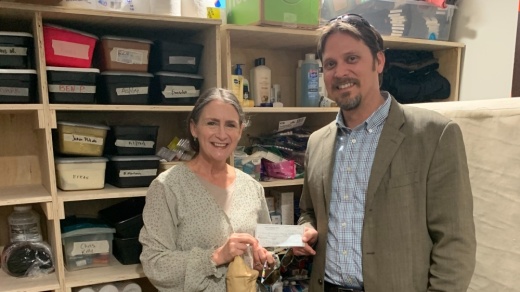Now, Stallings serves as the administrator for the First Footing Shelter in New Braunfels that was formed in 2020 in partnership with New Braunfels Housing Partners, the Comal County Homeless Coalition, the McKenna Foundation and other local nonprofit organizations.
Stallings spoke with Community Impact Newspaper about how the shelter has grown and what the long-term goals are for the project. Stallings’ answers have been edited for length.
Why does New Braunfels need services like a long-term shelter?
The population of New Braunfels has grown 43.9% [according to the U.S. Census Bureau] over the last 10 years, with little growth in services for those experiencing financial struggles, housing instability, or who are at risk of homelessness. This is echoed in the most recent annual point in time count, which revealed that 49% of those surveyed became homeless while living in the county and 44% were homeless more than once in the last 12 months. This data highlights a high percentage of individuals in the community who have experienced chronic homelessness.
A 2018 Workforce Housing Study showed 48% of renter-occupied units are housing-cost burdened. A recent review of this study revealed that little has been done to change this percentage since that time.
The local homeless coalition has understood for nearly a decade that the community has a growing gap in services to prevent and end homelessness.
How did the First Footing Shelter begin?
The McKenna Foundation was concerned about the growing gaps in housing affordability and the rise of people experiencing homelessness, so they sought the help of a national consultant. As a result of the consultant’s recommendations, the McKenna Foundation chose to support two initiatives in 2019-20 to advance the community’s progress in addressing housing instability in our community. A pilot winter shelter was operated from Dec. 28, 2019 to March 16, 2020 and served 107 people in only 2.5 months... Close to 75% of the individuals served were from the community, many who had lived their entire lives here.
The COVID[-19] pandemic merely compounded the existing affordable housing deficiency and gaps in homeless prevention and intervention services. Even more troubling, the cold weather shelter provider chose not to continue services.
As a result, after much discussion with the nonprofit community and the local homeless coalition, the McKenna Foundation collaborated with NB Housing Partners to implement an ongoing shelter for adults experiencing homelessness. Ensuring that our community members have a safe place to sleep is at the heart of the agency’s mission.
Why did you decide to utilize hotel rooms?
During the pandemic, there was a national push to protect the safety and the most vulnerable populations by getting those experiencing it off the streets and into safe shelter. As a result, many communities worked with local governmental leaders and hotel owners to lease hotel space, at a time when hotel occupancy had plunged due to the pandemic.
Our agency followed this trend by leasing hotel space to launch this initiative and received initial funding through a U.S. Department of Housing and Urban Development grant from the city of New Braunfels through the COVID Cares Act. This provided a win-win, both for our unhoused neighbors as well as the local business community and the entire community, which benefits from hotel occupancy taxes.
What are the long-term goals for the shelter?
While we are continuing to lease hotel space, our long-term goal is to purchase a facility to continue and expand services for our most vulnerable populations. As such, we see the solution involves planned and coordinated efforts from the nonprofit community, from the faith-based community and from local concerned citizens.
We hope to have a site in which multiple agencies can provide case management, counseling and other support to assist individuals and families with recovering from trauma or other struggles and with regaining their steps toward self-sufficiency and stability.
Long term, we also see the need for more accessible long-term housing options for those living at or near the poverty line, such as permanent supportive housing, subsidized housing, or more affordable housing options.





